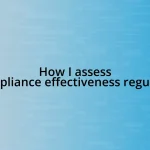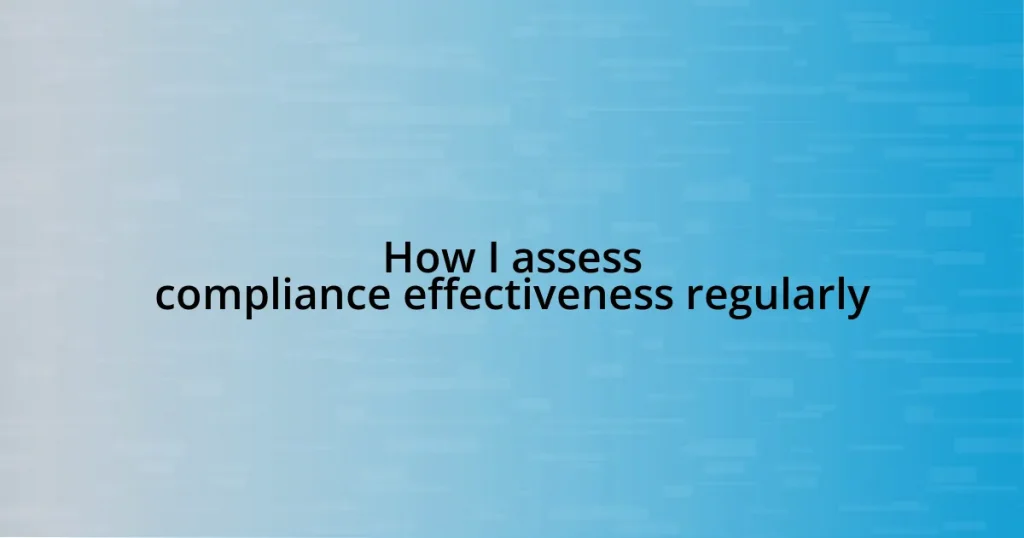Key takeaways:
- Responsible pet ownership involves regular vet visits, mental stimulation, and being financially prepared for emergencies.
- Creating a safe environment is crucial; secure fencing and minimizing hazards help prevent accidents.
- Nutrition and exercise are essential for pets’ health and longevity, requiring proactive engagement from owners.
- Supporting pet adoption initiatives fosters community compassion and reduces the number of homeless animals.
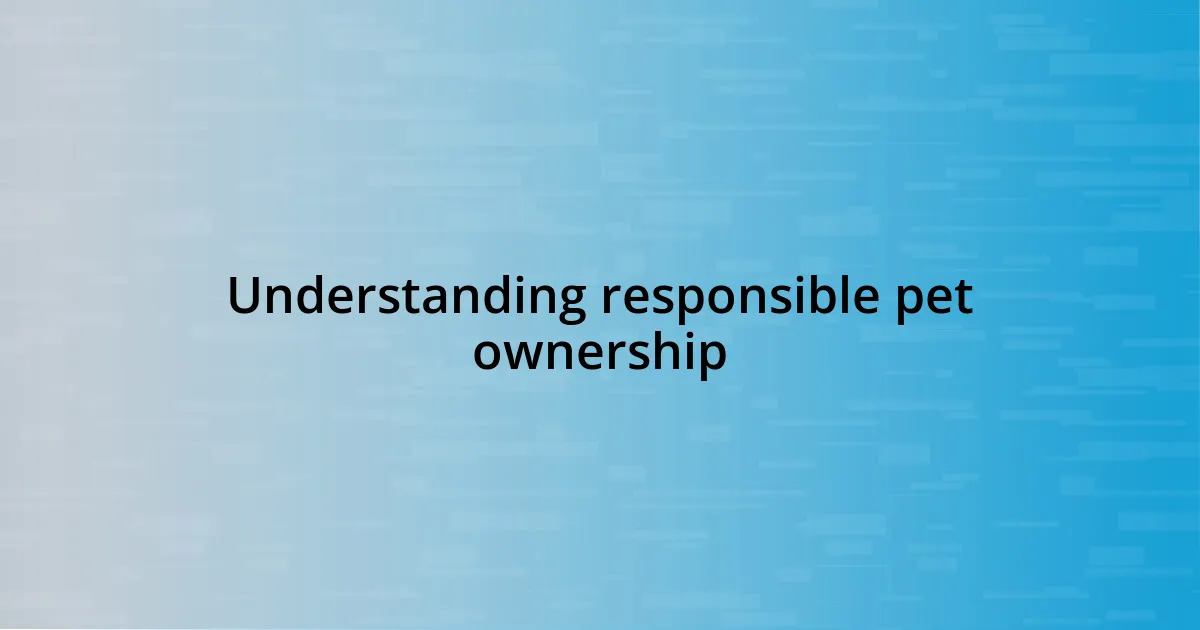
Understanding responsible pet ownership
Responsible pet ownership goes beyond just providing food and shelter. When I first adopted my dog, Bella, I realized that ensuring her well-being meant committing to regular vet visits and investing time in training. Have you ever thought about how much your pet relies on you for their happiness and health?
It’s also about understanding their needs and behaviors. I remember the day Bella chewed through my favorite shoes out of boredom. That experience taught me the importance of mental stimulation and exercise. Pets thrive in environments where they feel engaged, and neglecting that can lead to destructive behaviors.
Additionally, responsible pet ownership means being prepared for the unexpected. Last year, Bella fell ill quite suddenly, and it was a wake-up call about the financial responsibilities tied to having a pet. How would you manage if your furry friend had an urgent health issue? I learned firsthand that having an emergency fund for pet care is crucial for anyone considering bringing an animal into their life.
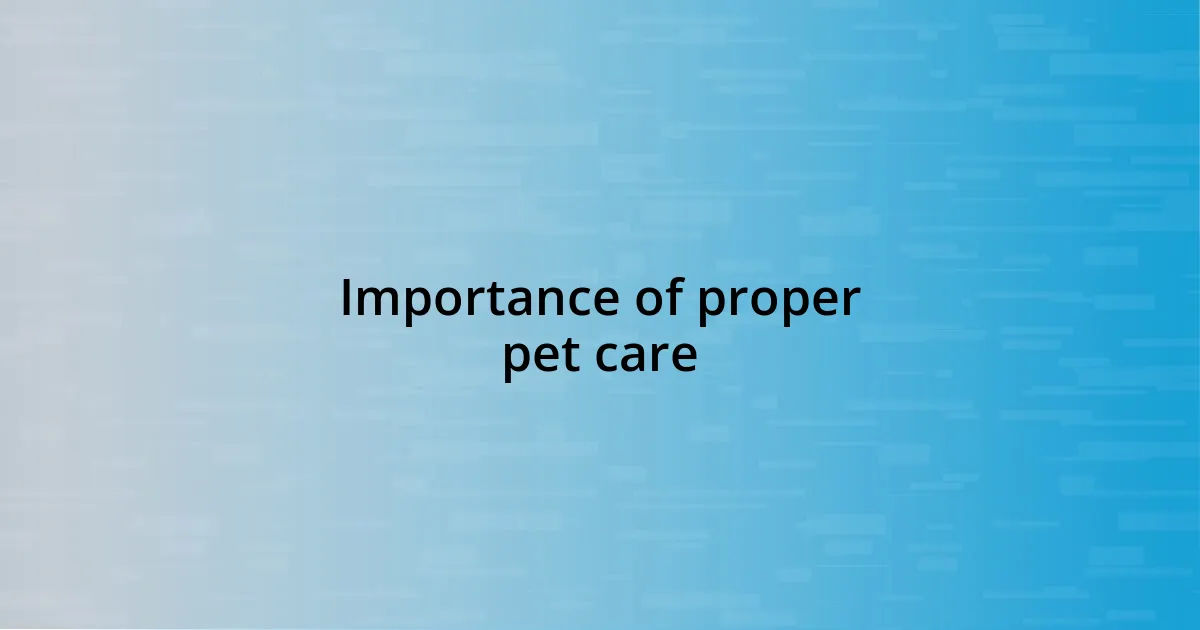
Importance of proper pet care
Proper pet care is essential for maintaining the health and happiness of our furry companions. I vividly remember the moment I forgot to schedule Bella’s annual vaccinations. The relief I felt when I finally took her to the vet and learned she was in good health was immeasurable, but it made me realize how easily things could go wrong. Regular check-ups are like preventive maintenance; they help catch issues before they become serious.
Mental health in pets is equally crucial. When I noticed Bella acting a bit withdrawn, I took it upon myself to consult with a pet behaviorist. This led to enriching our daily walks with varied routes and new challenges. By investing time in her mental wellbeing, I could see how much more vibrant and happy she became, reaffirming my belief that proper pet care is a holistic approach.
Lastly, let’s not overlook the social aspect. Bella and I attend pet meet-ups, which not only allow her to socialize with other dogs but also help me connect with fellow pet owners. These interactions have made me appreciate how sharing experiences and insights about pet care creates a supportive community. It’s a reminder that good pet care isn’t just about the pet; it’s about building bonds that enrich all our lives.
| Aspect of Care | Why It’s Important |
|---|---|
| Regular Vet Visits | Prevents serious health issues and assures peace of mind. |
| Mental Stimulation | Reduces boredom-related behaviors and enhances emotional well-being. |
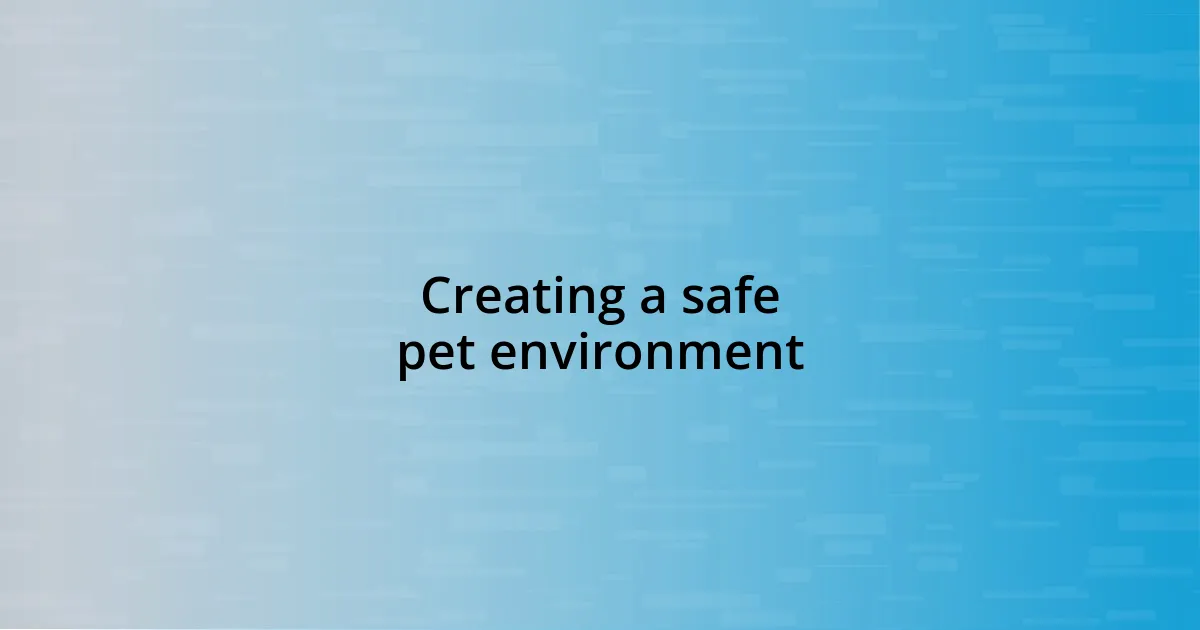
Creating a safe pet environment
Creating a safe environment for your pet is vital for their overall well-being. I once underestimated the importance of a secure yard when Bella escaped during a playful romp. That afternoon was filled with panic until I found her happily exploring the neighbor’s garden. This experience taught me that a well-fenced yard isn’t just a guideline—it’s a necessity to prevent potential accidents or encounters with hazards.
To ensure your furry friend stays safe, consider these essential tips:
- Secure Fencing: Ensure fences are tall enough and free from gaps or holes.
- Toxic Plants: Identify and remove any plants that could be harmful to your pet, such as lilies or sago palms.
- Safe Outdoor Zones: Create designated areas for play that are free from sharp objects or hazards.
- Proper Waste Disposal:Clean up pet waste regularly to prevent contamination and encourage a healthy environment.
- Indoor Safety: Keep dangerous items like cleaning supplies, medications, and small objects out of reach.
The peace of mind from knowing your pet is safe in their environment allows you to enjoy every moment together, without the constant worry of what might happen next.

Nutrition and exercise for pets
Nutrition and exercise go hand in hand when it comes to keeping our pets healthy and happy. A well-balanced diet is essential, and I’ve often found myself reading pet food labels to ensure Bella gets the best nutrition. Did you know that just like us, pets can suffer from obesity-related issues? I once noticed Bella gaining weight, and it became a wake-up call for me to switch her diet to one tailored for her age and activity level.
Exercise isn’t just about shedding those extra pounds; it’s vital for mental stimulation as well. I remember how excited Bella was when I decided to incorporate fun new activities, like playing fetch or teaching her tricks. It’s amazing to see her energy levels spike when she’s engaged in physically demanding play. Have you tried varying your pet’s exercise routine? Mixing things up not only keeps them healthy but also prevents boredom from setting in.
I can’t emphasize enough how the right balance of nutrition and exercise contributes to the longevity of our furry friends. When I started tracking Bella’s meals and walk durations, I discovered patterns that helped me keep her vibrant and joyful. Seeing her thrive has not only deepened our bond—it’s a reminder that responsible pet ownership involves being proactive about their wellbeing!
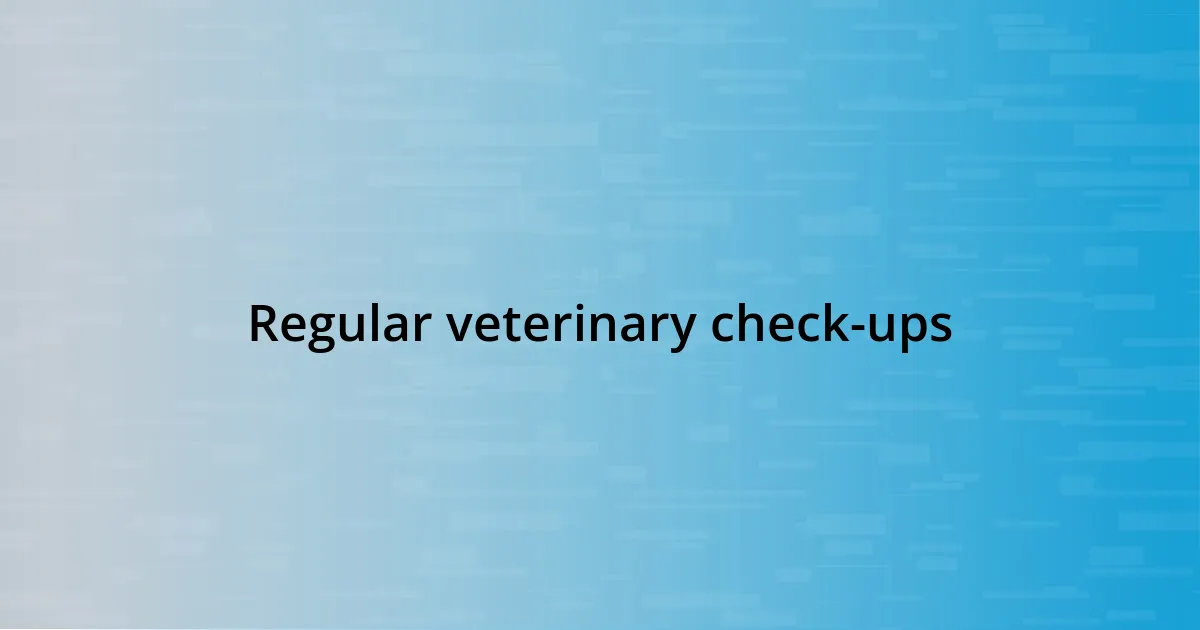
Regular veterinary check-ups
Regular veterinary check-ups are a cornerstone of responsible pet ownership and can significantly impact your pet’s quality of life. I learned this firsthand after a simple visit to the vet revealed that my cat, Max, had an early stage of dental disease. It was surprising how something I thought was minor turned out to be a crucial health issue. If I hadn’t taken him in for that routine check, the consequences could have been severe.
These appointments aren’t just for vaccinations; they allow vets to catch potential health problems before they worsen. I remember feeling anxious before taking Bella in for her first check-up, but my worries melted away when I saw how knowledgeable the vet was about her breed. It became clear to me how crucial these visits are—they unveil even the hidden issues that could impact our pets down the line. Have you ever wondered what secrets your pet might be hiding? A thorough exam can uncover them.
Regular vet visits also provide an excellent opportunity for pet owners to discuss any behavioral changes or concerns with professionals. I’ve often used these appointments to ask about Bella’s sudden shyness and received valuable advice on creating a more comforting environment for her. Honestly, the insights I’ve gained from those discussions have shaped our daily practices and strengthened our bond. It’s a reminder that, as pet owners, we owe it to our beloved companions to be diligent about their health care.

Supporting pet adoption initiatives
Supporting pet adoption initiatives is a vital way for us to contribute to the welfare of animals in need. I still remember the day I visited the local shelter and met Bella; her soulful eyes and wagging tail tugged at my heart. Isn’t it incredible to think that, by choosing to adopt, we open our homes and hearts to pets who deserve a loving family? I believe that every adoption story has the potential to inspire others and spark a chain reaction of compassion.
I often find myself participating in community events focused on pet adoption, and it’s heartwarming to witness the connections being made. Just last month, I attended an adoption fair where a sweet older dog named Charlie found his forever home. Seeing his new family embrace him made me realize how impactful these initiatives can be. Have you considered volunteering or spreading the word about local adoption events? Every effort—big or small—helps to reduce the number of homeless animals and gives them a chance at a better life.
Supporting these initiatives also goes beyond just adoption; it involves raising awareness about the importance of spaying and neutering pets. I recall discussing this with friends who thought it wasn’t necessary, but when I explained how it helps prevent overpopulation and reduces shelter overcrowding, they began to see its significance. Isn’t it rewarding when we can share knowledge that positively impacts lives—both animal and human? By being advocates for responsible pet ownership, we can play a significant role in fostering a compassionate community for pets everywhere.

